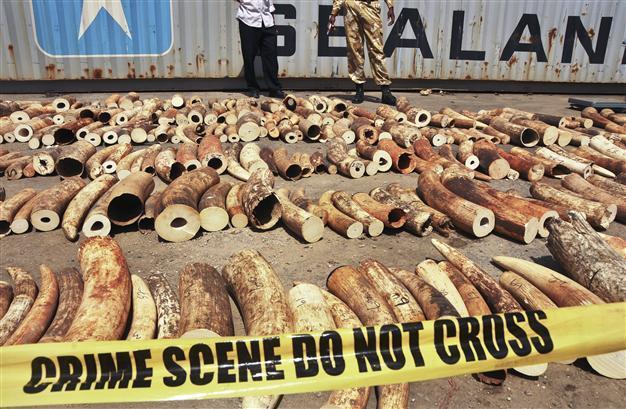Kenya seizes 4 tonnes of ivory as elephant slaughter surges
NAIROBI - Agence France-Presse

Kenyan officials display some of more than 1,600 pieces of illegal ivory found hidden inside bags of sesame seeds in freight traveling from Uganda, in Kenya's major port city of Mombasa, Kenya, Tuesday, Oct. 8, 2013. AP Photo
Kenyan customs officers have seized almost four tonnes of elephant ivory in two separate shipments, officials said Wednesday, amid a surge in poaching of the threatened animals.One haul of ivory weighing some 1,900 kilogrammes (4,200 pounds) was discovered Friday at the Indian Ocean port city of Mombasa, hidden under bags of sesame seeds, said Kenya Revenue Authority official Fatma Yusuf.
On Tuesday, a further two tonnes (4,400 pounds) of ivory was discovered in another container disguised in a similar manner, with both shipments bound for Turkey.
The seizures are the latest of several giant hauls discovered, representing the massacre of scores -- if not hundreds -- of elephants.
In addition, over 500 kilogrammes (1,100 pounds) of pangolin scales -- meaning potentially dozens of the threatened scaly anteaters were hunted -- for use in traditional medicine and as fashion accessories in Asia.
As in other parts of Africa, poaching of elephants -- as well as rhinos and other animals -- has risen sharply in Kenya in recent years. Whole herds of elephants have been massacred for their ivory.
In July, over four tonnes were seized in two shipments, one hidden beneath peanuts and the other mixed in with stinking dried fish, with both destined for Malaysia.
Kenya Wildlife Service director Arthur Tudor said searches at the port were being increased in a bid to stop smugglers.
We want to ensure that our port is not used as a transit point of ivory," he said.
"We have to step up the war on poachers to completely wipe out the ivory trade... it is threatening elephant populations in the country and entire region." Ivory trade is banned under the Convention on International Trade in Endangered Species of Wild Fauna and Flora (CITES).
Africa is now home to an estimated 472,000 elephants, whose survival is threatened by poaching as well as population expansion and increasing urbanisation encroaching on natural habitats.
The illegal ivory trade, estimated to be worth up to $10 billion (seven billion euros) a year, is mostly fuelled by demand in Asia and the Middle East.
Elephant tusks are used to make ornaments and rhinoceros horns are used in traditional medicine.
















